Ben Larken
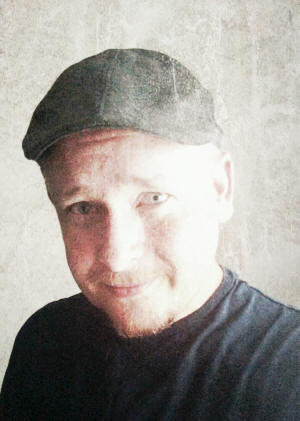 |
Ben Larken is the author of the Epic Award-winning novels
Pit-Stop, The Hollows and Pillar’s Fall. He lives outside of
Fort Worth, Texas, where he works as a police dispatcher.
WEBSITE:
www.larkenbooks.com
TWITTER: https://twitter.com/BenLarken
FACEBOOK: https://www.facebook.com/larkenbooks
|
New Title(s) from Ben Larken
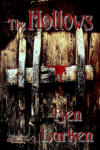
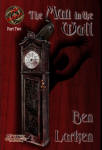
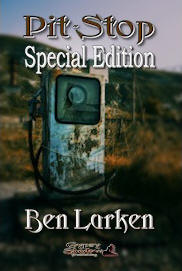

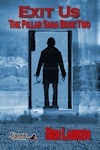 
Order The Hollows in PRINT Today!
Order The Man in the Wall Print Today!
Order the Pit Stop Print Today!
Order the Pillar's Fall Print Today!
Order the Exit Us Print Today!
Order The Babel Walker Print Today!
Congratulations to Ben
for being in the 2013 Preditors and Editors top ten Horror Category for
The Man in the Wall

Click on the thumbnail(s) above to learn more about the book(s) listed.
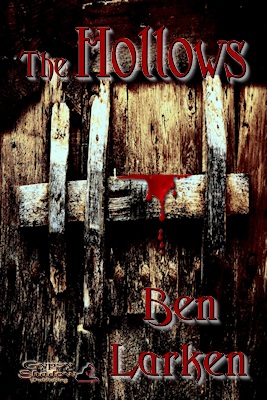
|
Former detective David Alders is forced
to downsize to an apartment after a decade searching for his
missing wife. To avoid staggering debt, he and his daughter
Melanie move into the Whispering Hollows, a complex full of
older residents, like the charmingly befuddled Eldon or the
redneck property manager Charlie.
On the first night Melanie is terrorized when a burnt corpse
crawls into bed with her. And events only get stranger as David
finds himself reliving the same day twice! Suddenly, time travel
is an all-too-real tool at his disposal, one he can use to
finally return to the love of his life.
But time travel comes with rules. Deadly consequences await
anyone bold enough to break them. As David wades cautiously into
the past, he learns the awful truth of his existence:
He didn’t choose The Hollows. The Hollows chose him…
Excerpt
Word Count: 112000
Buy at:
Smashwords (all formats) ~
Barnes and Noble ~
Amazon
Price: $5.99 |
| |
|
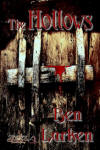
|
(ISBN #978-1-61950-154-6) To order this book in print,
please contact Charlotte Holley at
cholley@gypsyshadow.com |
|
|
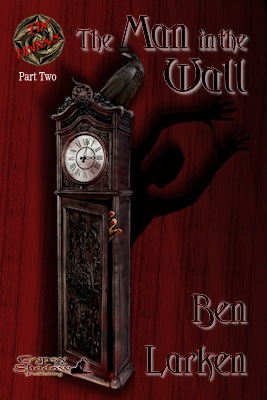 |
Now that David Alders knows time
travel is possible inside The Hollows, his mind is set on one
goal—to save his wife Elise. He has one chance to get it right
and decides to try changing the past on a test subject. A
nightmarish spate of child killings known as the Wetzel Murders
occurred in the 70’s, and David believes he can erase them from
history.
But The Hollows has other plans…
Excerpt
Word Count: 178000
Buy at:
Smashwords (all formats) ~
Barnes and Noble ~
Amazon
Price: $6.99 |
| |
|
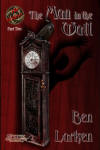
|
(ISBN
#978-1-61950-169-0)
To order this book in print, please contact Charlotte Holley at
cholley@gypsyshadow.com
|
|
|
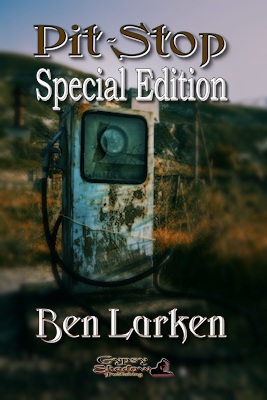
|
The last stop on the road to Hell…
Highway patrolman Scott Alders sits in a roadside diner along a
desolate stretch of Arizona highway. He doesn’t remember how he
arrived. Neither do the other patrons, although their waitress
tells them a bus is coming. It will take them the rest of the
way to a destination of unspeakable horrors. The group of
strangers unite with a common goal—escape. Each of them feels
the weight of their own dark secrets. But personal demons are no
match for a crimson-eyed bus driver with a schedule to keep.
Larken’s first novel is still one of his most terrifying. Winner
of the Epic Award for Best Horror, Pit-Stop now comes with a
mini-sequel that spurs the story in a whole new direction. So
sit back, have a cup of joe, and soak in the calming, deadly
atmosphere of the Pit-Stop Grill—the last attraction on Route 66
you’ll ever want to visit.
“Pit Stop is a non-stop thrill ride. Right up there with King,
Barker and Straub.”
—John Parker, The Southern Horror Writers Association
“Good novels have a hook in the first few pages, but this
premise of cheating the devil’s coachman is a fishing line with
hooks all along to the last chapter.”
—Compulsivereader.com
“I didn’t want to put the book down for fear of what might
happen next.”
—Crystal’s Book Reviews |
| |
Excerpt
Word Count: 83000
Buy at:
Smashwords (all formats) ~
Barnes and Noble ~
Amazon
Price: $5.99 |
|
|
|
 |
(ISBN #978-1-61950-174-4)
o order this book in print, please contact Charlotte Holley at
cholley@gypsyshadow.com |
|
|

|
Detective Thomas Pillar had no premonitions of the day
ahead. He didn’t know he was about to clash with a sadistic
lunatic on Railston’s only suspension bridge. In one
gut-wrenching moment, Pillar was forced to make a life-or-death
choice that left the entire city shaken and set a madman’s plan
in motion.
Now, months later, it’s starting again...
This time, Pillar is investigating a string of rage-filled
murders, and all of the clues point to the most unlikely
suspect—a twelve-year-old named Seth Morrissey. The child seems
nice, if a bit lonely, but something malevolent and demonic
lurks beneath his surface. While Pillar searches for answers,
the thing inside Seth prepares for a showdown that will rip
Pillar’s life to shreds and pave the way to hell on earth.
As the body count rises and Pillar’s marriage begins to unravel,
he races against time to stop the force that is pulling all the
strings. But how do you destroy the demon without killing the
innocent child? This is Pillar’s dilemma. This is Pillar’s
story.
This is Pillar’s Fall.
Excerpt
Word Count: 108400
Buy at:
Smashwords (all formats) ~
Barnes and Noble ~
Amazon
Price: $6.99 |
| |
|
 |
(ISBN: 978-1-61950-223-9)
o order this book in print, please contact Charlotte Holley at
cholley@gypsyshadow.com |
|
|
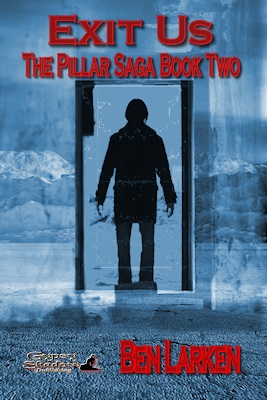
|
Winter has come to Railston.
Shattered from the loss of his old life, Thomas Pillar hides,
chilled by the past as much as the falling snow. Ross Medford,
more media sensation than detective, knows his days as head of
the Pillar taskforce are numbered. Both men have hit a
standstill—but that’s about to change.
After a failed suicide attempt, Pillar finds himself in the
condemned hotel Elysian Falls, living amongst Railston’s
homeless. Vagrants are being picked off by a mercurial stranger
wielding a sword, their bodies carved with an otherworldly
message: EXIT US. No one knows what it means, but Pillar
realizes the hunter is searching for something he possesses, a
key that will open a doorway to another realm. As Ross and his
team draw near, demonic forces clash and a trail of murder
blazes through the city—a trail that leads straight to Pillar.
Can Pillar stop a madmen obsessed with igniting a demon
apocalypse? How can he defeat an opponent who knows more about
his purpose than he does? One thing is certain. If Pillar fails,
the world may never see another spring.
Excerpt
Word Count: 123700
Buy at:
Smashwords (all formats) ~
Barnes and Noble ~
Amazon
Price: $6.99 |
| |
|
 |
(ISBN: 978-1-61950-225-3)
To order this book in print, please contact Charlotte Holley at
cholley@gypsyshadow.com |
| |
|
| |
|
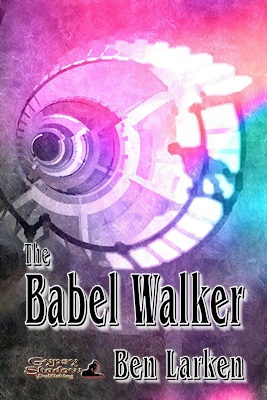
|
Sarah Bridges awakens on the roof of an endless skyscraper,
kicking off a perilous journey to return to the life she once
knew, but otherworldly forces, both inside the tower and on
Earth, conspire to stop her at any cost.
In Chicago, Eddie Conroy, already reeling from the loss of his
wife, plunges into a nightmare as trauma strikes again—this time
in the form of a man in a ski mask who abducts Eddie’s son.
And in Texas, small-town firefighter Doug Underwood stumbles
onto the strangest arson case of his life when he discovers
local celebrity and romance author Sarah Bridges floating
unconscious in her pool amid the fiery debris that used to be
her home.
So begins The Babel Walker, a Christian-themed novel brimming
with suspense, action, and heart. The tower in question is the
same Babel described in Genesis, which now houses the souls of
the living. When people die on Earth, they sleepwalk to Babel’s
roof, where a tornado of light whisks their souls into Eternity.
But Sarah’s not quite dead, giving her an unprecedented chance
to find her attacker and save his next victims. But can she stop
a madman before her soul slips away from her Earthly body for
good?
Excerpt
Word Count: 122500
Buy at:
Smashwords (all formats) ~
Barnes and Noble ~
Amazon
Price: $5.99
|
| |
|
 |
(ISBN: 978-1-61950-265-9)
o order this book in print, please contact Charlotte Holley at
cholley@gypsyshadow.com |
| |
|
| Excerpts |
|
| The
Hollows |
Elise’s Journal: December 28, 1993
I tried to get my wedding ring back today. I pawned it two weeks
ago so we could buy some decent presents for Melanie. David
doesn’t know. He started at the police academy last month and
he’s barely bringing home enough to pay the utilities. He
probably thinks I borrowed the money from my brother, although
he doesn’t realize that the idea makes me as livid as it makes
him. But I wanted Mel to have some good presents. I know she’s
only three months old. I don’t care. This was her first
Christmas and our first Christmas as a complete family. I wanted
it to be special.
The pawn shop guy couldn’t find my ring. He spent an hour
searching the jewelry shelves, the merchandise storage bins, the
owner’s desk, everywhere. I don’t know if he did it for show or
if he saw a young woman with a baby in her arms and tears
streaming down her face and felt compelled to keep going. His
compassion hit its expiration after sixty minutes. He stopped at
the counter, shrugged, and said something to the effect of,
That’s that.
Excuse me? As far as I was concerned THAT most definitely was
not THAT.
Look, lady, he said. You gave us the ring. We gave you money. I
know you didn’t mean it to be permanent, but sometimes you have
to take the trade as it stands.
The jackass.
I spent the rest of the afternoon at home, crying my eyes out,
wondering if David would forgive me. Melanie was the one who
pulled me back. I watched her in her crib, staring quietly up at
her new Beauty & the Beast mobile. She focused on each
individual character as it circled past—the princess, the
candle, the Beast, the clock. Her wide eyes flickered in
amazement for all of them. That’s when I realized the pawn shop
guy was right, even if he would forever be known as Mr. Jackass.
Our first Christmas as a family had been perfect. I would
remember it always. At the end of the day, the wedding band was
just something I wore. The trade was worth the memory.
Tomorrow I’ll tell David the ring fell down the bathtub drain.
THE CLOCK STRIKES ONE
1
The Buckner Farm
May 13, 1949
For Tess Buckner the only worthwhile activity on that blustery
Texas afternoon was standing between two clotheslines in the
backyard and letting the sheets billow against her. White cotton
sheets lifted on the breeze, tickled her nose, and played dead
again. She held out her arms, turning her little body into a T.
The sheets rose to the occasion, taking her hands in loose but
enthusiastic handshakes. Tess giggled.
Then the breeze quieted and so did she. Momma’s head bobbed over
the clothesline on the right, her squinty gaze catching Tess at
once.
“I thought my pischouette came out here to help her mother,” she
said in that tone, sounding both amused and annoyed.
“I’m only so big,” Tess explained. “These clotheslines are too
high for me.”
“Which means I should give you a chore more suited to your
size.”
“But Maw-aaah,” Tess said. “I’m helping. I’m looking out for
dropped drawers.”
Mare Buckner smiled. “I assure you, my drawers are not in any
danger of dropping.”
Tess took a moment to catch her mother’s meaning. “I mean from
the line, silly.” She laughed. The sheets thought it funny too.
They billowed up in their own silent fits of hilarity.
“Tell me a story,” Tess said. She couldn’t see Momma beyond the
sheets, but she didn’t have to see her to know she was rolling
her eyes. Tess waited and asked again. “Tell me a
story…pleeease?”
“You’ve heard all my stories,” Mare replied, but Tess didn’t
believe her. There are endless quantities of certain things. The
beach will always have enough sand. The sky will always have
enough rain. And Momma will always have a story squirreled away
in the corner of memory taken up by childhood.
Mare Buckner grew up in Nawlins. At least that’s the way she
pronounces it. Papa insists it’s pronounced New Orleans. It’s
only a teensy bit away from Texas, where they live. Tess once
put her fingers on the United States map at school, one on New
Orleans and one on Fort Worth, and the gap was barely the size
of a dime. Part of her longed to see Momma’s Nawlins, but Papa
sounded like the distance was too far to be troubled with.
Tess rounded the sheets as Mare pulled one of Papa’s shirts from
the basket. Tess tugged on the shirt. “A story, Momma. Story,
story, story…”
“Tess Elizabeth Buckner,” Mare said, snapping the shirt back.
“You’re about to hear the story of the girl who spent all day
pulling weeds as punishment for back-sass.”
“But you haven’t told me one in weeks,” Tess pleaded. Momma
didn’t know that Tess repeated the stories at school. She had
grown popular retelling them. A small circle of third graders on
the playground gawked at her in awed silence as she spun tales
of Southern jinxes and Vodun curses. Even big-shot Arnie Fetters
occasionally shuddered or gasped in surprise. If the stories
ever got back to the teachers she’d be in for an earful from her
mother. But for the moment Tess was willing to take that chance.
Besides, Tess loved the way Momma sounded as she told them. That
accent she tried hard to simmer down most times came bounding
back to life during a story. Tess always thought she was
glimpsing Momma in her truest, most beautiful form.
“I’ve got it,” Tess said, holding a finger up like her teacher
did when making a point. “If you tell me a story I’ll pull weeds
in the flowerbed for a full hour.” She rocked on her feet as her
mother looked at her. “You have to admit, that’s a pretty swell
deal.”
Mare watched her. From the kitchen window ledge the radio
switched songs. I’m Looking Over a Four Leaf Clover gave way to
the dreamy Bing Crosby crooning Now Is the Hour. Tess listened,
swooning in the breeze, as Bing melodiously said goodbye to a
dear loved one sailing away.
“The weeds can wait another day,” Mare decided. “But that
doesn’t mean you’re getting a story for free.”
Tess grabbed her mother’s dress. “I’ll do anything.”
Mare grabbed another piece of clothing from the basket. Tess
cracked a smile when she saw it was Papa’s drawers. “Fetch that
pail off the back porch,” Mare instructed. “If you can go down
to the river and make it back with a pail-full of water I’ll
tell you a story.”
“That’s it?” Tess bounced happily. Their well pump had gone out
yesterday evening, giving Papa a chance to use many of the words
Mrs. Gershon said were Paddle Words. “I can do that.”
Mare propped her hands on her hips. “Then why are you dancing
around here?”
Tess didn’t need further motivation. She darted for the porch,
grabbing the pail by the handle without slowing. Rounding their
two-story farmhouse she nearly banged the pail into Papa’s candy
apple red Studebaker. She pulled back in time, thankful she
didn’t scratch the paint. That wouldn’t have been pretty, for
the paintjob or her behind.
She slowed to skip across the flat stones surrounding the circle
drive, being careful not to get caught on the rosebushes near
the porch. Beyond that was the rusty old barn. Tess hurried past
it, hearing Papa’s disgruntled tones echo through the loft
window. He was somewhere in there, grumbling to himself and
banging tools and getting himself all in a dither. Papa spent
whole days dithering in the barn and on those days Tess knew to
steer clear. When a matter couldn’t wait it was Momma who
ventured into the barn, and she never came out looking happy
about it.
Past the barn the forest began. It looked dense and forbidding
to a first-timer, which Tess was proud to say she wasn’t. The
forest wasn’t as vast as it first appeared. It covered three
acres at most and once inside, the trails were easy to follow.
Within minutes you emerged from the other side, staring at the
Trinity River. But for a few precious moments the woods came to
life in that same mystical way Nawlins did in mother’s stories.
The silence seemed watchful, as if something unseen waited in
breathless anticipation.
Tess was through the first acre when she heard the sound. It was
low and barely audible. She cocked her head and stopped, peering
up at the canopy of branches and the shards of sunlight that
pushed through the leaves like hungry fingers. Her body went
rigid as the sound drifted over the breeze again.
A groan. She heard a low, muted, raspy groan.
It was a ragged, withering voice that could have been male or
female. She twisted slowly, finding it difficult to move. The
sound didn’t come from any one direction. But it was close. The
more she listened the closer it felt. She stared at the forest
floor, seeing pine needles dappled in sunlight. The shadows were
more noticeable.
The groan lifted, becoming a reedy warble. Someone had to be
hurt, maybe from tripping over a branch or getting bit by a
snake—or worse. Tess wanted to call out. Her lips parted but her
voice didn’t follow. Her mouth had gone dry as dirt. The groan
spiked again, passing through her like an electric shock. Tess
coughed.
“Are…are you okay?” Had she said it out loud? If it made it past
her lips it came out as a whisper. Tess tried again, pushing the
words out one at a time. “Hello? Who are you? Where are you?”
The groan broke into a series of dry coughs, sounding like the
distant gunfire she heard during hunting season. A thump
followed the coughs and then silence. Tess waited, realizing the
abrupt end to the noise was scarier than the noise itself. The
fear put her in motion. “Hello?” she called louder. “Where are
you? Tell me where you are.”
No answer. She moved deeper into the forest, leaving the path.
Bushes snagged at the blue summer dress Momma had bought last
week. She couldn’t stop to disentangle herself from every little
branch. Faces of her schoolmates floated in her mind as she
imagined each one lying with a broken leg and grasping at the
air for help. Tess climbed a small rise and tried again.
“Please call out again,” she cried as she stepped carefully over
a trunk and into a small grove of trees. A group of crows took
flight, shooting upward from every side. Tess staggered to avoid
them. Her foot landed on something that wasn’t ground. Up above
a crow cawed in annoyance. She had already forgotten the crows.
Her focus was on the large wooden door she stood upon.
The wood was nearly green from years of overgrowth. The metal
clasps and the old padlock on the handle were so rusted they
looked bloodstained. It was a cellar door or more likely a storm
shelter. Spring storms in these parts would justify having one,
but why so far from the farmhouse and so well hidden? The
surrounding trees were like guardians protecting the door from
the outside world.
The groan came again. Tess screamed and leapt back, dropping her
water pail. The sound came from directly beneath her. She knelt
on the ground and knocked on the door in a panic, not wasting
time thinking. Someone was down there, someone who needed her. A
cold knot tightened in her stomach.
“Who are you?” she cried, banging the door with her small fist.
“Are you hurt?”
The groan lowered to a whimpering. It sobbed, and Tess brought
her ear close to the wood, taking in every sniffle. It whispered
only one word.
“Mm-mm—momma.”
Tess scrambled to her feet and grabbed the first heavy thing she
saw, a fallen branch not two feet from the door. Tess hefted it
as best she could, shifting it onto her shoulder, and took a
stance over the blood red lock. “Don’t you worry,” she said.
“I’m getting you out of there.”
With a squeaky grunt she swung the branch and got it on the
first try. The branch hit the heart-shaped padlock, and the
metal shattered like an ancient vase. She probably could have
kicked it with her shoe and gotten the same result.
She lugged the branch aside and grabbed the door handle, hoping
it wasn’t as breakable as the lock. “I’m opening the door,” she
announced to whoever was down there. If it was a small child she
didn’t want to scare him or her. She squatted and braced
herself—and then pulled.
It was hard, but not as hard as she expected. The door didn’t
shift from its resting place at first. The roots and weeds at
its borders played tug-of-war with her. Tess thought of the
cowering child waiting inside and put her back into it. Weeds
ripped. Roots cracked. The door swung until gravity helped her,
allowing her to let the door fall against a tree. Tess found
herself at the top of a staircase, staring down into blackness.
The overbearing stench of mildew forced her to take a step back.
Sour air wafted over her, the underground lair exhaling after
years of holding its breath. She wondered how someone could
actually be waiting down there. She kept looking in the oily
darkness, hoping for a sign of movement.
“Can you walk?...Hello?”
No movement. No sound. Had she scared the child? The daylight
could be too bright for someone who spent a long time in
darkness. She squatted again and held out her hand, like someone
befriending an uneasy dog.
“It’s okay. You can come out. I wanna help.”
She waited but no response came. Rising from the squat, she eyed
the rotten-looking stairs warily. Only the first four were
visible in the light, and there was no way to know how many
followed or if they were intact. And yet the toe of her shoe
drifted closer to the first one. Her shoe touched the wood and a
soft creak echoed in the darkness. She let her other foot follow
until she was completely on the step. It sagged a little, but it
didn’t break. She was sure of it. She—
Hands closed on her shoulders.
Tess gasped as she was pulled backward. The hands spun her
around until she was staring into Momma’s taut face. “Tessie. Tu
dèlires? I send you for water and you decide to go exploring
instead? Well, I think I have several other chores that need
your immediate attention.”
“But Momma!” she erupted. She twisted in her mother’s grip,
pointing into the black hole. “There’s someone down there! I
heard em crying. I think the person’s hurtin’.”
Mare had started pulling her the other way, but stopped to look
back. She eyed Tess first and then the door. It was obvious she
had never seen it before either. She turned her gaze to her
daughter. “Wait. What?”
“The child’s down there, I promise.” She stared up at Momma,
letting the tears come. “I know he ain’t making noise now, but
he’s down there. He is. I wouldn’t make this up. Not this.” She
tugged on her mother’s dress, praying Mare wouldn’t think she
let her imagination get the best of her. Adults had a way of
ignoring the important stuff.
Mare’s gaze remained steady. “All right,” she finally said. “Let
me take a look.”
Tess nodded gratefully and they turned to the waiting darkness.
Mare stepped past her, keeping one hand firmly on Tess’s
shoulder to let her know she wasn’t to follow. Momma went to the
doorway and stopped at the edge.
“Who’s down there?” she demanded. “Tell me your name and how you
found your way onto our land. There’ll be no hiding and
seeking.”
Mare waited with hands on hips. Now that she put it in those
words Tess wondered if someone had toyed with her for sport. If
that was the case there would be a fight on the school
playground tomorrow. And if it was Arnie Fetters he could expect
to go away from it with a bloody nose.
No answer came. Momma waited a whole minute before turning to
look at Tess.
“I heard someone.” Tess looked at the hole in the ground, hoping
in vain to see a child crawling off of the stairs.
“I know you did, Tessie, but whoever’s down there isn’t going to
fess up to it. We’ll have to go back to the house and ring the
police. Allons.”
With a gentle touch Momma took her by the shoulder and turned
her around. Tess didn’t need convincing. She was happy to turn
her back on the strangely-placed storm shelter. And she was
happy Momma was with her too. To think she had almost stepped
down into that blackness alone.
“Don’t worry,” Mare said as she squeezed her. “I’ll still tell
you a stor—”
Momma’s hand jerked away as she let out a guttural cry. Tess
wheeled around to see her mother on her stomach, writhing in the
dirt as she flew backward. Her dress bunched around her waist as
some unseen thing yanked on her feet. Her fingers clawed the
ground, raking at loose leaves and making trails in the dirt.
Her eyes blazed panic.
“Tess!” Mare cried. Tess flung her small body toward the dark
opening in the ground that wanted to swallow Momma. Nothing
happened fast enough. Tess couldn’t make her legs react as
rapidly as her heart. Her arms were pitifully short, her hands
pushing through air like fish fighting the current. Tess’s index
and middle fingers brushed the stony white knuckles of Momma’s
left hand. Then Mare was ripped away, disappearing into
blackness. Tess heard several hollow thumps as Mare Buckner
tumbled down the steps. Then the scream came, so awful and loud
Tess thought she had to be in a dream.
“Momma!” she cried back, crawling madly to the edge of the
staircase. She saw movement like bugs crawling on the trees at
night; a glistening shape one moment, a sense of liquid motion
the next. She cried for her mother again and again. And then she
saw her, or at least her hands, shaking as they came into the
light.
They were much too white as they grabbed the lowest visible
stair. Momma’s waxy face came into view and Tess screamed. Her
chin and neck were red with blood. Momma’s eyes quivered in
their sockets, but they bulged farther when they fell on Tess.
“Run,” Mare said, and the voice might have been the same raspy
whisper she heard earlier. “Please, Tessie. Run.”
Mare’s gaze dropped as she gagged. She vomited on the stairs,
spraying blood over the mildewed wood. Something else moved in
the darkness and Momma was yanked out of view. A sickening
ripping sound followed.
Tess ran. She ran so hard she couldn’t remember running later.
It was as if she turned from the hole in the ground and ran
straight into Papa’s barn. He rose from his workbench on lanky
legs, asking what the hell she was doing. Tess screamed
something about Momma and a cellar and a voice. She grabbed
Abner Buckner by his overall straps and yanked with everything
she had. “Help me!” she bellowed. “Help Momma!”
He stopped cussing and followed, grabbing a scattershot rifle as
she took off back into the forest. A moment later they were
there, looking into the blackness. Abner fished a lighter from
his pocket and squatted next to the opening.
“Honey?” he yelled, waving his lighter toward stairs. “Mare, you
in there? Did you fall or sumthin?”
“It’s down there,” Tess said through her sobs. “Something hurt
Momma.”
Abner braced the rifle in the crook of his arm and started down
the stairs. The flicker of the lighter was barely enough to
light his way. But he went down the stairs, seven in all, and
then a concrete floor. From the edge of the opening Tess saw
glimmers of half-rotted shelves lining the walls. She saw stacks
of old crates covered in thick coats of dust. What she didn’t
see was her mother.
“Are you sure she went down here?” Abner asked, bending over to
move the light across the floor. “I can’t even see her
footprints in the dust.”
That wasn’t what bothered Tess. What her eyes stopped on and
couldn’t veer away from no matter how hard she tried were the
wooden stairs. She peered at the grayish-green planks, feeling a
lump rise in her chest.
“The blood,” she whispered. “The blood is gone.”
Abner Buckner looked at his daughter’s rigid posture. She was on
the verge of fainting, and he hadn’t the slightest notion why.
But when he stopped calling for his wife, he heard something. It
was oft and easy to miss amid the swaying tree branches, but the
longer he listened, the more he thought the sound was there in
the cellar with him.
Ticking—like the ticking of a clock.
|
|
Back to The Hollows |
| |
| The Man in the Wall |
Elise’s Journal: March 24, 1999
He should have been back by now.
That’s all I can think. It’s the one sentence that circles my
head all day like an annoying song. He should have been back.
Like, days ago. Hell, he should’ve been back five minutes after
he left. I mean, I’m talking about time travel. I don’t know how
he’s making the trip, but if he’s able to make it at all he
should find his way back to the same time period, right? He
could punch some coordinates into a super-computer, give the
Flux Capacitor an oil change and just pop back to the same day
he last saw me. That makes sense, doesn’t it? God, I’ve got a
headache.
Future David. That’s the name I gave him a week ago, this
rumpled guy with the tortured eyes who showed up in my front
yard. He’s the guy who knows something too terrible for words is
about to happen to me. I know, because I tried to make him say
those words and he couldn’t. Part of me wanted to strangle him
for that, but another part of me reminded that part that I AM in
love with this man.
Well, that might be true. But sometimes love isn’t worth the
pain. Or love shouldn’t cause so much pain. Or something
greeting card-y like that.
Last night I was thinking of him again, my mind drifting as I
sliced apples and separated them into plastic baggies for Mel’s
school lunches. Mel was in the front room soaking her brain in
Dora the Explorer. Hop (that’s Present David, the man who has
absolutely no idea that Future David paid me a visit last week)
was enjoying his day off by catching up on paperwork, a task
which seems to define a detective even more than detecting. He
sat at the kitchen table, scribbling something in triplicate,
and I let my brain devolve into the same line of circular
questioning that has become the bane of my existence. It goes
something like this:
A. Why isn’t he back yet?
B. What if he CAN’T come back?
C. What if he’s in some kind of trouble?
for instance:
D. What if that creepy oily-haired bastard in the Roaming
Plumbers van grabbed him?
That’s the question that caused me to put the knife down and
grab the counter to steady myself. I tried to stop where my
thoughts were headed, but as usual I couldn’t. I saw Future
David in a slasher movie, where the audience sees the bad guy
sneaking up on the innocent victim. Hop hates taking me to those
movies. I’m the viewer who shouts at the screen. DON’T GO DOWN
THAT HALLWAY! or TURN ON THE GODDAMN LIGHT BEFORE YOU GO IN
THERE! That’s what I was about to do to the movie playing in my
brain, the one where Future David walks out of the Candlelight
Inn and the red van swoops in and... and... the rest of
the scene brings tears to my eyes. Because it’s never anything
good. It’s not like the giggly bastard stops him to hand him a
plumbing gift certificate or ask if him if he’s considered being
a Jehovah’s Witness. I can see those manic eyes as he said the
words that have since been seared into my brain.
You’ll have to learn to share him... Just like he’ll have to
learn how to share you.
God, I’m putting the pencil down. I need a tissue.
Okay, I’m back. So obviously, Question D is not my favorite
question. It always turns me to emotional jelly, and that moment
last night was no different. But it gets worse. Question D
always leads to Question E, the most hopeless question since God
asked Cain if he’d seen Abel around. It’s the one that puts
everything in perspective and makes me realize just how insane a
situation I’ve found myself in.
E. What do I do about it?
“Those apples are going to turn brown if you don’t bag them up
and get them into the fridge—” said Hop, who was right next to
me, leaning on the counter.
I jumped. He chuckled, giving me a sideways hug, which I
accepted rigidly. The alternative was to melt into his arms, and
if I did that I would start bawling and never stop. I’d tell him
the whole crazy story and he’d have me committed.
He pulled back, watching my stony expression. “You’re edgy,” he
said. “And I don’t blame you. I know I’ve got you worried.”
I let out a bitter chuckle. If he only knew. “Yes,” I replied.
“You’ve got me worried.” (I left off the part about him breaking
the laws of space and time.)
He nodded and crossed his arms, something I imagine he does
every time he’s about to interrogate a perp. But I wasn’t the
perp in this situation. HE was—or will be—in ten years, when he
decides to come back in time and mess with my head. (Have I
mentioned I’ve doubled the amount of weekly headache medicine I
buy?)
“You think I’m forgetting you,” he said. “You think I’m getting
all caught up in my little world and I’ve left you to fend for
yourself.”
“Well...” That was all I could say, because it was truer than
I wanted it to be.
He had one of those inner conversations with himself. I saw the
back-and-forth in his eyes. It didn’t take him long to come to a
conclusion. He looked up again and smiled curtly.
“Right, then.”
That was all he said. He turned and exited the kitchen.
“Umm, Hop?” I stood there next to my bruised apple slices and
waited for him to come back. But he didn’t, and it wasn’t like
him to give up so quickly. I finally lost my nerve and went
after him. “Hop,” I called as I crossed the kitchen, “I’m not
that upset. We don’t have to make this a big dea—”
I stepped into the hallway. There he was. He hadn’t gone three
steps beyond the doorway when he turned and got on one knee. He
held up a diamond ring.
“I’m not trying to bribe you,” he said, his eyes large and
earnest. “I just wanted you to know why I’ve been working so
hard.”
“Hop,” I said, my voice lost after that.
“Five years ago your wedding ring disappeared down the drain,”
he said. “I’ve always taken it as a bad omen for our marriage.
And I didn’t want a bad omen hanging over us. More than anything
else in this life, I want us to work. So I knew I had to take
the next step. No more being a beat cop. Even if it meant moving
heaven and earth, my wife was not going through life without a
proper wedding ring.”
He went silent and waited for my reaction, the ring glimmering
in the hallway light.
That thing I said about melting into his arms and bawling? Yeah,
I did that. What can I say? He gave me an opening, and I went
with it. He tried to give me the ring, but my fingers were too
shaky, so we both kind of clung to it for a second. I held him,
letting my view of the sparkly thing connecting us dissolve into
tears. This diamond ring that on the one hand was just jewelry
and on the other meant the whole world. Because he was right, I
realized. I want us to work, too. And what did that mean for
Question E?
Well, it meant I needed to take the next step.
Tomorrow after David goes to work, I’m cracking open the phone
book. It’s time to call the Roaming Plumbers.
|
| Back to
The Man in the Wall |
| |
| Pit-Stop
(Special Edition) |
1
“Can I refill your coffee?”
The question plucked Officer Scott Alders from his haphazard
state of meditation, but only slightly. He had been gazing at
the spoon next to his thumb, enjoying the gleam of sunlight off
its silver. The glare created a crescent of light on his
knuckle. He looked up from the spoon and saw a waitress
uniform—a pea green dress with a crisp white apron. He scanned
her front, pausing at her gnarled white fingers with fire engine
red nail polish. He halted again at the throat of her dress, at
the way the top button was undone, giving view of a corded neck
that he associated with an elderly person. The face was a mental
climax. The bony chin. The white little hairs on her upper lip.
The lips themselves, also doused in that fire engine red. Her
dully arched eyebrows, plucked around the edges. Gray hair with
staggering streaks of white. And then the forced smile,
revealing teeth the color of old paper.
In another place and time, he would have glanced at the woman in
polite acknowledgment and turned away. But at the moment her
face fascinated him. It was a landscape of unexplored and
somewhat rugged valleys, ridges, and wrinkles. He smiled, noting
the way his mustache bristled. He liked that feeling, too. So he
smiled harder.
“Can I ask your name?” Scott said, sounding airy and silly and
nothing like the man he knew himself to be. It sounded like a
pick-up line—one he had used before, no less. Fifteen years ago
that had been, the party after graduating the academy. Where he
met Stephanie. Geez.
The waitress glanced down at her chest, her pupils lowering in
the most intriguingly annoyed way. He followed her gaze and saw
a nametag on her apron strap. HOLLY, the plastic tag proclaimed.
“Would you like a refill or not?” she asked, after he stared at
the nametag for too long.
He perked up again and nodded, not comprehending the question.
No—to anything—simply wasn’t in his vocabulary. Scott beamed as
she lifted a coffee pot and poured black liquid into his cup.
The smell, he thought, what a luscious smell. The trickling
invigorated him even more than the spoon or Holly’s face. When
it was over—all too soon, he felt—he looked up again, like a dog
at its master. She smiled curtly and turned away.
“Holly?”
She slumped as she heard his voice, as if expecting this. When
she glanced back, her eyes almost screamed, What, you idiot?
Scott wasn’t offended by it. Offended wasn’t in the vocabulary
today either.
“What, hun?”
He tried to remember his question, finding it hard amid the
realization she had called him hun. But he sensed her growing
impatience, so he struggled to reach his thought.
“How did I get here?”
She turned a little more, looking at him with weary eyes. She
smacked her lips loudly.
“You wandered in, hun—just like the rest of them.”
“But I... I feel like I just woke from a dream.”
She snorted. “Yeah, that happens sometimes. Not often, but
sometimes. Usually they stare at their coffee and never make a
peep.” She looked at him pointedly. “I like those customers.”
“But—I...”
“Just keep staring at that spoon,” she said, already turning
away. “Everything’ll feel better.” With that she continued down
the row of booths, stopping three tables away to refill somebody
else’s coffee. Scott watched her, his mind swirling with
follow-up questions. Wandered in from where? How long have I
been here? Why did your parents name you Holly? The questions
dissipated as his gaze opened to the rest of the diner. It was a
vaguely retro joint with cream-colored chrome-rimmed tabletops,
checkered tile floors, and hanging Sputnik lamps. The place
emitted a warm Norman Rockwell vibe with its basic streamlined
architecture. A line of maroon leather booths adjoined a wall
full of panoramic windows, while the center of the diner
showcased a grand stainless steel bar flanked by metallic
stools. He immersed himself in every detail, remembering a dozen
classic movies where good guys sat in diners like this and
sipped their cups of joe. The whole scene filled his heart with
the best of Americana. How had he spent his whole life in places
like this and not taken more notice?
Stephanie, no doubt, would say the same thing.
Scott scanned his table, with the standard formation of ketchup
bottle, napkin dispenser, and salt and pepper shakers against
the wall. He looked out the window next to him and saw a neon
sign next to the highway. “The Pit-Stop Grill” blinked dully in
the midday glare, its zigzag font designed to point directly at
the diner. Beyond the sign was a brilliant reddish-white
landscape. Arizona desert, the Painted Desert. Rugged hills gave
way to sudden flatness, making everything look like a huge
toasted tortilla. Only the gleaming gray of I-40 and the dark
silhouettes of two old-fashioned gas pumps broke up the
monotony. And cloud shadows. Scott couldn’t see the clouds, but
their shadows slid across the desert floor like sharks beneath
the surface of the water. Something about the view sent a chill
into him, which he thought odd since it looked hot outside.
He turned and continued analyzing this fascinating-for-no-reason
diner. There were other customers. Of course, there were. This
was a great place to be. He scanned the faces, all as detailed
and unique as his new best friend Holly. He counted eight, and
they varied in just about every way. White, black, fat, thin,
bald, hairy, male, female, young, and old—they all stared at
their tables with the same pleasant dispositions.
According to Holly, they all wandered in. Scott smiled again. He
was in the middle of something special. Here were all these
strangers pulled into a group for this brief moment. Souls drawn
together by the need to eat, the need to refuel, and whether
they realized it or not, the need to feel other souls in their
midst. How he wished Michael was here. Scott had never felt as
wise and at one with himself as he did right now, and it seemed
a shame not to pass it on to his son.
You can’t, a tiny voice in the back of his mind whispered.
Michael’s not talking to you. And you’re not talking to him
either.
Scott’s gaze reverted to the spoon with the magic sparkle. He
didn’t like that voice’s tone. It was too critical, and it
brought a moment of uncertainty to his serenity. At the same
moment tires screeched outside, sounding very close. He turned
to the window, but the highway was empty. There weren’t any cars
or pickups or big rigs. He didn’t even see his police cruiser,
which was unusual and caused him to frown. One thing a highway
patrolman never forgot was where he parked his cruiser. You
never knew when an emergency call would come in. But Scott had
forgotten where he parked it. In fact, he wasn’t sure he
remembered driving it here.
Maybe you didn’t, that same voice said, louder than last time.
Maybe this isn’t the type of place you can drive to. That means
you got here another way.
“I wandered,” he said aloud, though not loud enough for anyone
else to hear. “Like Holly said. I wandered in like everyone
else.”
Must’ve been a hot walk. As Scott’s gaze dropped from the window
he noticed he was wearing his uniform and felt a surge of relief
when he saw everything was there. His badge, his belt, his
nightstick and his pistol were all where they were supposed to
be. But not your radio, the voice pestered. You left it in the
car apparently—the car you lost.
Scott grunted and shook his head, getting rid of that prissy
little voice, getting rid of the uncertainty that came on the
heels of everything it said. He probed the room for something to
bring back that magic feeling again. It didn’t take long. Holly
dumped another batch of ice into the soda dispenser and the
crinkling sound washed over him like a symphony. He smiled, took
a deep breath, and told himself he was fine. Everything was
fine. Everything was beautiful, as Ray Stevens liked to sing.
Scott’s lazily drifting vision landed on something—eyes staring
at him. His spine straightened. The eyes were cold and black and
belonged to a young man sitting on a barstool. Or a young body,
he thought. The eyes looked older. The man had dark hair, a
pointy nose and striking eyes that refused to veer away. How
come he doesn’t blink? Scott’s mind chuckled in response. Now
that you mention it, Scott, how come you don’t blink? The young
man’s eyes narrowed, scrutinizing him harder.
Then he rose from his barstool and started toward Scott.
Fear tickled his gut as the young man approached. Maybe it was
an after-effect of that critical inner voice, but something
about this twenty-something seemed wrong. It wasn’t his clothes.
They entranced Scott as much as everything else. The well-worn
Adidas tennis shoes, blue jeans, a black T-shirt with the words
Just do it laid out in white, and a red flannel button-up shirt
with the arms ripped off. The young man frowned in a way that
didn’t match the rest of the Pit-Stoppers’ satisfied smirks.
Scott wondered if the young man was holding back a scream. His
hands were shoved in the pockets of his blue jeans, and the
pockets vibrated as if he had a couple cell phones in each one.
Or his hands are shaking. That’s why he’s hiding them in his
pockets, Scott reasoned. He can’t keep the tremble out of his
hands.
The young man stopped when he reached the table’s edge. They
studied each other, Scott looking at the young man in befuddled
curiosity and the young man staring into his eyes, searching for
something that didn’t seem to be there, which made the young man
frown harder.
“You don’t remember, do you?” the young man asked, his voice
scratchy and low, like someone coming out of a hangover.
Another tickle of fear ran through him, like fingers over piano
keys. Scott swallowed, making his throat click, and knew without
a doubt that he was about to have the most important
conversation of his life.
“No,” Scott said, and the young man nodded, because that was the
answer he had expected.
|
| Back to
Pit-Stop |
|
| Pillar's
Fall |
... Tom opened the door. Ross was already back in his gleaming
silver car, revving the engine impatiently. Tom moseyed down the
front steps, reminding himself not to call it silver. Ross
preferred the technical term quicksilver. He climbed in the car,
and the BMW 850CSi jerked into motion before Tom had shut the
passenger door.
“We feelin’ anxious today?” Tom ventured, looking at his
partner.
Ross Medford grinned, his eyes hidden behind a large pair of
sunglasses, his blonde Brad Pitt hair slicked back, his lips
barely hanging onto a toothpick.
“No, I’m feeling the rails. What are you feeling?”
“Curious at the moment. You gonna tell me where we’re going?”
The BMW took a corner, screeching as it went, heading out of
Tom’s middle-class neighborhood at a speed that would have Tom’s
neighbors calling to complain later. Everyone in the surrounding
blocks recognized the Ross-mobile by now. Tom saw it in the
disgruntled faces of joggers and the frustrated gazes of
children who had been restricted from street football because of
a certain crazy driver. Not that Ross had ever caused an
accident. He cared way too much about his V12 super car to let
that happen. But if there was one thing Ross was good at, it was
looking like he didn’t care.
“The subway,” Ross answered, wheeling the BMW out of the
residential area and heading toward the highway, site of another
favorite game: speed-weaving.
“The subway?”
“The subway.”
“Why are we going to the subway?”
“To feel the rails, of course.”
Tom rolled his eyes. Shoulda known. “Ever think of getting a new
catchphrase?”
“Don’t need one. Already got the perfect one right here. I’m
feeling the rails. I’m running on all cylinders. I feel the
momentum beneath me. I’m at peak performance. I mean, come on,
haven’t you ever sat on the subway and listened to the rails
slipping by? It’s freakin’ poetic is what it is. Feel the rails,
Tom.”
“You are so deep.” Tom laid his head back on the seat. “You
know, the rails usually make me sleepy. And I’m feelin’ em now.
Yes, sirree, I would say if I don’t hear some sort of
stimulating information in the next five seconds, I’ll be out
like a light.”
The BMW took another corner, forcing Tom’s head off the seat.
“That’d be too bad,” Ross commented. “Because then you wouldn’t
hear about the terrorist I’m about to bust.”
“Is this the same satanic-cult wacko you’ve been talking to on
the Internet for the last three days?”
“The one and the same.” Ross grinned again. “I told you I’d bank
on this one.”
“You’re always telling me you’ll bank on something. Last month
you announced you’d make detective early by banking on copper
theft. Spent a whole week staking out a hotel under construction
as I recall. And the only thing you really banked was a lecture
from the boss on the misuse of overtime.”
“Copper theft was too small time,” Ross admitted. “We live in a
post-9/11 world. If you want to make a name for yourself, you
gotta aim for the higher threat levels. Bag yourself a backwoods
militant set on blowing up a government building and you’re
talking to Brian Williams by the end of the night. I’m finally
in that ballpark now, and I’m almost at bat.”
“We’ll see,” Tom said. “What makes this one different?”
“The difference is that I made contact with the guy’s kid. I
spoke to his son and the boy’s going to arrange a meeting. The
bastard actually has his son doing his secretary work. He even
emailed me a photo so I’d know how to identify dear ol’ dad.”
Ross shuddered with nervous excitement. “He’s one creepy-looking
fucker, too. Dark greasy hair, skin as pale as the moon, and a
long trench coat—he might as well wear a sign that reads TACKLE
ME. I’M A TERRORIST.” He flashed his conspiratorial smile at
Tom. “So we’re going to the subway, where this guy is going to
buy some illegal arms off of us.”
Tom cocked an eyebrow. “Illegal arms? Off of us? Gee, if I
didn’t know better, I’d say we were riding close to entrapment.”
Medford shrugged. “Eh, maybe. I’m not worried about it. The
moment we bust this guy, we get permission to search his house,
and boom, there’s all the proof you’ll ever need.”
“This guy’s stockpiling?”
Another shrug. “Probably.”
Tom rolled his eyes. “Probably... damn, you make me nervous.”
Ross snickered. “Hey, that’s half the fun of having me for a
partner. I don’t think you’ll be complaining when Boss T
promotes us to detective-lieutenants.”
Tom gazed at the world beyond the window, mainly guardrails and
traffic cones, a few family vans with no families in them,
several executives jabbering into their cell phones. As the car
entered a suspension bridge, shadows sprinkled through the
light. It was the only one in Railston, titled after some
honorable fellow who had been saddled with the unfortunate name
Woodward D. Fluxom—thus the Woodward D. Fluxom Bridge. No one
ever called it that. Since Tom moved here, fresh from high
school and years of living in a group home, he always heard it
called the Flux. Now they were riding over old Flux, and Tom
squinted at the sunlight reflecting off the foamy river.
“I think that’s the difference between you and me,” he said,
scanning the web of rusty silver bridgework. “You’re looking for
the next promotion... I’m happy where I am.”
Ross sniffed. “You can’t tell me you wouldn’t enjoy being a
full-fledged detective. Besides, I need you. You’re the one who
watches my back.”
“I’m not saying I won’t enjoy it.” Tom looked at his partner, a
smirk on his lips. “As long as watching your back doesn’t turn
into kissing your ass.”
Ross laughed. This was the norm. Tom insulted him for being a
prima donna, and Ross turned it into a joke. Ross would come
back with some sly comment about how good Tom was at it. Or he
would go ahead and promise him, acknowledging his desire to be
the star to Tom’s sidekick. But Ross never got to make that
promise. Because at that moment, Hell came looking for Thomas
Pillar.
Midnight passed in front of the car, so silently and stealthily
Tom only vaguely noticed the change. Just another morning
shadow, like those coming from the suspension wires. Tom glanced
forward, his eyes focused on a black spot in the road ahead,
rapidly enlarging. A man in a heavy coat stepped into the
street, less than fifty yards away. He lumbered into the traffic
lane, using long legs to make slow but deliberate steps. Tom’s
eyes veered to Ross, his body bracing for the quick swerve that
would happen any second. But to his horror, Ross’s eyes were on
his side mirror, a sly grin on his lips, as if checking out the
driver behind him. Tom looked forward, hoping the man had
already passed their lane. But he hadn’t. Instead, the lanky man
had come to a dead stop.
“Ross!”
Ross snapped to attention. He saw the man, too, poised like a
totem pole against the sunrise. He jerked the wheel, and the
whole world jerked with it. Tire screeching ripped through the
air like a record’s needle off its track. Colors shot around
them like a tornado. They spun through lanes, chopping their way
through the dense morning traffic. Other cars honked and
swerved, barely missing the BMW. Then the guardrail found them
and everything fragmented. A walloping thrust as Tom’s chest
fused with the seat belt... a deafening bang as the BMW’s
hood split open and peeled back... a single cry from Ross
before the airbags overtook both of them.
And then silence.
In the minutes that came next, Tom noticed one thing. The air
seemed thicker. Maybe it was the airbag—the harsh plastic smell
his nose was buried in—or the chemical odor of leaking car
fluids. It could have been any of those things, but as he slowly
lifted his head, he realized it wasn’t. The air felt more than
polluted. It felt unnaturally thick, a presence bearing down on
him. He inhaled, and the atmosphere tickled his throat. Tiny
fingers wriggled toward his lungs. Vibrations slithered over his
entire frame, and his heart leapt in his chest. The charge in
the air had him scanning beyond the broken windshield, looking
for fallen power lines. He saw nothing, which should have made
him feel better.
It didn’t.
“Ross,” he whispered, his voice dry and cracking. “You okay,
Ross?”
Ross didn’t answer. Tom’s fingers quickly located his partner’s
arm and then his partner’s wrist. The pulse was good. He was
just unconscious. Tom was about to shake him awake, but heard
the passenger door open.
“Mister,” a woman said. “Hey, are you all right?”
Her Chevy Suburban was parked a few feet away. Other cars were
stopping as well. The whole bridge would be clogged in moments.
“Yeah, I’m all right,” he said, hoping he wasn’t lying. “Can you
help me out of here?”
The lady nodded and let him hook an arm around her shoulder. Tom
pushed away from the airbag, every muscle in his chest groaning.
Sounds came into sharper focus now. The rumble of dozens of
engines filtered through the air, joined by a similar rumble
coming from the river below. That’s all it is, he told himself.
The cars... the rushing river... they’re making me even
more jumpy. Nothing unnatural about that. As his feet hit solid
ground, his vision began to spin. He grabbed the roof of the BMW
to steady himself.
“What happened?” the lady asked, her hands shaking worse than
Tom’s. “I watched you guys veer off the road.”
Tom stood up straight, his spine cracking. “There was a man,” he
mumbled. His eyes widened. “That man.”
In the midst of the lines of cars stood the man in the heavy
coat—no, not just a heavy coat, a trench coat. His frame shifted
back and forth like a pendulum, though his eyes were fixed
squarely on Tom. Wispy black hair fluttered around his
shoulders. His face was long, and his complexion—dear God, his
skin looked gray.
“Don’t worry,” the lady said. “I called the police already.
They’ll be here soon. Why don’t you sit down and take it easy
until they get here?”
The man’s eyes—bloodshot with clammy white pupils. They drilled
deeper into Tom with every passing second, and he had the
immediate sense that he wasn’t looking at something human. Those
slimy white pupils belonged to a sea monster pulled from the
darkest crevices of the ocean.
“Just a second,” Tom said, ignoring the fading dizziness. He
stepped into the throng of cars, wishing Ross had shown him the
photo the boy emailed to him. He had a terrifying suspicion that
the image would match the man in the street. His .38 was still
in its holster, but his fingers were around the grip, ready to
draw. In all his years on the force, he had never gone for his
gun. Yet something about this man’s crazed stare told him he was
going to need it this time. The certainty of it chilled his
insides.
He got in line with the man and stopped twenty feet away. For a
moment, his gaze was pulled from the man’s face to his trench
coat. The coat was too long on him, stretching to the ground and
hiding the man’s feet. Every button was buttoned, and it looked
thick on him, as if the man had several layers of clothes on
underneath. Tom thought about pulling his badge, then decided
not to. He had the man’s attention already, so Tom spoke.
“Why did you step into the street?”
The man smiled, revealing a set of half-decayed yellow teeth.
“Do you know how long I spent preparing the sacrifice?” he said
in a gravelly voice. “Three years I prepared the sacrifice!
Three years I used the serum. Three years I performed the
ceremonies. Yet the master had no use of my sacrifice. The
master had already chosen another.”
Tom pulled his badge and held it up. “I said why did you walk
into the street?”
The man clicked his teeth, baring purple gums. “So what good am
I now? If I cannot provide the vessel of the master, how can I
serve him?”
He’s a nut wandering the street. Tom couldn’t buy it, no matter
how much he wanted to. This man was calculating. Tom’s fingers
tensed around his weapon, but he resisted the impulse. They
weren’t alone here. People watched through their car windows. A
young family with a baby in a stroller had stopped on the
walking path to stare in curiosity. A man driving a fuel truck
spoke into his CB, probably giving a scoop to other truckers
stuck on the Flux. They were all here, all trapped for the
moment on this gleaming steel bridge, and Tom didn’t want to set
off a panic. But as he looked into those predatory white pupils,
he realized he might not have a say in the matter. This man
wanted something, and whatever he did to get it might inevitably
lead to panic.
Or he might want nothing, Tom told himself. Because he’s just a
wanderer. Just a mental-case wanderer.
“Who is the master?” Tom tried, hoping to take over the
conversation.
The man’s eyes blazed. “The master! The eye of the storm. The
center around which all darkness orbits. The master is almost
here, and when he arrives, he’s going to kick the shit out of
this world.” The man cackled. “He’s going to kick the shit out
of you too, Officer Pillar.”
The gun came out of its holster, pointed at Mr. Trench Coat in
less than a second. In his periphery, he noticed people ducking
inside their vehicles, but he couldn’t focus on that yet. “Who
are you?” Tom yelled. “How do you know my name? Were you waiting
for us to drive by? Who are you?”
The man’s eyes turned skyward. His hands rose in the air, palms
up. Tom noticed the inside of his wrists. Black syringe holes
dotted pale skin like swarms of gnats. “How can I serve the
master now? How can I make my sacrifice worthwhile?”
“Damn it! Who are you?”
“I know!” the man cried. “I can give the sacrifice to my
master’s enemy. I can give my sacrifice to the legendary Pillar.
My lamb will not be wasted.”
The man’s hands dipped to his chest. “Hold it!” Tom yelled, but
the man began unbuttoning his trench coat. Tom stepped forward.
He was going to take this bastard down. Sirens clanged in the
distance. They would be here in minutes, and they could cuff the
madman and take him downtown. Tom only had to hold him until
then. Keep him from doing something cra—
The man flipped open the trench coat.
Tom froze. Huddled against the man was a small boy, no more than
seven. His back was to Pillar, his arms clinging to the man’s
legs like a lifesaver. Large blue eyes squinted at him. Tom
wasn’t focused on the boy’s face. His gaze was stuck on the row
of sticks duct-taped around the boy’s midsection.
Dynamite.
A car honked, making Tom’s heart skip. Cars all around him broke
into motion, reversing away from the epicenter of unfolding
madness. But they only caused a string of fender benders behind
them. It was bumper car havoc, everyone scrambling, but getting
nowhere. All three lanes were at a standstill. Most of the
drivers weren’t seeing the boy and the lunatic holding them.
They were all absorbed in their own little worlds, yelling at
the closer drivers who had gone insane. Radios were turned up
and cell phones were in use. Even the woman who had helped him
from the car was busy inside the BMW, trying to rustle some
consciousness out of Ross. But no one was coming to help. For
all intents and purposes, Tom was alone.
The man’s grotesque smile quivered. “Go to him, my son. Go to
the Guardian.”
The boy trembled, but turned like a trained animal, and moved
toward Tom. His heart froze as he saw the boy’s chest. An
electronic readout hung over the dynamite. Numbers ticked away
on it—00:58, 00:57, 00:56.
“What the hell are you doing?” Tom asked, his voice feeling
small.
“He’s yours,” the man offered. “He’s your sacrifice.”
“No, he’s not,” Tom said, pleading. “Come on, turn off the bomb.
We don’t have to do this.”
“Oh we do,” the man insisted. “The whole world has to do this.”
00:41, 00:40, 00:39...
Tom lifted his gun. “I said turn it off! Do it now!”
The man cackled again. His arms lifted upward in worship.
“Master! Look to me and let my act please you!”
00:32, 00:31...
Tom’s eyes jumped from the rows of log jammed vehicles to the
fuel truck four spaces back to the child with his arms
outstretched, walking toward him. He had realized a moment ago
that he was alone on this one. Now he wished he could be so
lucky.
00:25, 00:24...
“You’ve got one more chance!” Tom yelled desperately. “Turn it
off!”
The man dropped to his knees, his hands still raised. “Let the
Jesottunea begin.”
00:17
Tom ran forward, scooping the child up in his arms. He heard a
car door nearby open. As he passed the man in the trench coat,
he heard a deep, foreign chanting. It barely sounded like a real
language.
“Hey, what’s the problem over there?” the woman pushing the
stroller said.
Tom ran, weaving through the cars, moving out of the lanes,
across the walking path. He reached the railing and glanced down
at the readout.
00:10
“Close your eyes,” he whispered to the boy. “When you wake up
this will all be better.”
Tom lifted the child above his head. God, forgive me. Then he
flung the boy, tossing the child with everything he had. Nearby
a woman screamed. That scream was quickly matched as the young
boy found his voice. The child’s face flashed through the air
and then disappeared beyond the railing. The tiny scream pitched
downward, toward the sun-drenched river below. Tom stood
petrified, listening to the sound fade, waiting to hear the
splash or the explosion—whichever came first.
A splash. The terrified cry of a seven-year-old snapped off in
an instant.
Thomas Pillar didn’t move. As the seconds went by, he stayed
right where he was, the walls of his mind imploding. The timer.
It had already run out. It ran out before the boy hit the water.
The truth—the truth that punctured his heart—was much simpler.
The bomb had never been armed. The timer had only been there to
fool him. The boy had fallen needlessly to his death.
A tremor ran through Tom’s soul. He couldn’t move. His feet were
dead, his lungs insufficient. His stomach was hollow.
And somewhere behind him a man in a trench coat cackled like a
lunatic.
|
| Back to
Pillar's Fall |
| |
| Exit Us |
Chapter Three
December
Sunt lacrimae rerum
There are tears for things. Life is tragic.
—Virgil
Sunlight broke over the canyon wall, illuminating the wooden
monolith in the center of the rocky plain. Thomas Pillar lay
crumpled on his side, his forehead resting uncomfortably on a
large stone, three feet from the upright rectangle. His eyes
flickered open, unfocused. He stared blankly at the brown door,
at its simple frame, at the rusty hinges. Pink light reflected
off the knob’s tarnished silver. Everything was quiet here. The
wind was a forgotten whisper. Animals were nonexistent. Just the
sky and the ground and the door—a land of bare minimums.
Sometimes that was comforting. There were times, coming with
more frequency lately, when Pillar needed the solitude. He
needed to pare away the unnecessary excess and clutter of the
world. He needed a place as vast and empty as his soul.
Other times, like now, he longed for something else—when he
caught himself wondering what would happen if he opened the
door.
He sat up, his arms resting on his knees, facing the door. A
single word sat at the edge of his tongue. It had wanted to be
uttered for weeks, ever since the thought hit him, but he hadn’t
been brave enough. The implications were too ominous. His eyes
skipped over the barren crevices and withered walls. He knew it
was time. He opened his mouth, trying to overcome the urge to
hesitate.
“Charlotte?”
His voice came out small, but he didn’t care. Volume didn’t
matter much in this place. “Charlotte, are you in there?”
He waited. Regret seeped into the fringes of his mind. She
wasn’t in there. Of course, she wasn’t. Why had he been stupid
enough to think—?
“Tom?”
His eyes widened. He scrambled towards the sound. Soon his hands
were on the door’s chilly veneer. “Charlotte! I’m here.”
“Tom,” she said. “Oh Tom, where are you? I can’t see anything in
here.”
“I’m right here, baby, on the other side of the door. Are you
okay? Are you hurt?”
“God, Tom, where have you been? I’m scared.”
Pillar ran his fingers down the door, seeing her face in his
mind. “I know you are. I am, too. I miss you bad.”
Something ran down the other side of the door—fingers. “Tom, let
me out. I don’t want to be in the dark anymore.”
He turned his eyes to the old knob, the pink sunlight still
beaming off it. His fingers drifted toward it and then stopped.
“Tom,” she whispered, right on the other side. “What’s wrong?
Open the door.”
“I—I’m not supposed to.”
“What? Tom, I just want out. You can close the door behind me.”
He rested his forehead against the door, closing his glazed
eyes. “If I do, bad things will happen.”
The voice came back wounded. “Do you not want me anymore?”
“Baby, no,” he said, a tear slipping down his cheek. “I want you
so much, it hurts. I need you. I’m nothing without you. I’m
nobody.”
“Then open the door,” she sobbed. “Let me hold you.”
His fingers drifted again. He looked down and saw them resting
on the knob. His jaw clenched. Another tear broke free. “I don’t
know what to do, Charlotte. What if something else gets out?”
“There’s nothing else here. But you have to hurry, because
they’ll be back soon. Hurry and open the door. I want to feel
you against me.”
He was silent, choking on his own emotions. His fingers grazed
the knob. All he had to do was add a little more pressure. He
could turn it quick, and she’d be here again. Charlotte would be
back in his life. He—
“Damn it, Tom,” she cried. “Why won’t you open it? First you
shoot me, next you trap me in here. Let me out already!”
He pulled his head back. One thought came to the forefront.
“You’re not Charlotte,” he whispered.
“Tom,” she pleaded, but her voice changed. The light, warm tone
he knew so well shifted. It deepened. It gargled. It sounded
horrible. “Tom, Tom, Tom,” the slimy voice croaked. “Fucking
Tom. Fucking bastard Tom. I’m going to get out of here soon. And
when I do, you will feed on your own excrement.”
“Go away,” he said, his voice dwindling. “Leave me alone.”
A raspy laugh came through the cracks. “We’ll never leave you
alone, Pillar. Not until you open the door. Turn the knob
already.” Something pounded the other side, making the dust fall
from the frame and the hinges squeal. Then a second pounding
came, booming through the canyon, and he leapt back as the door
bent outward.
“OPEN THE FUCKING DOOR!”
Tom’s head jerked up and a cold spasm riveted his body. “No!” he
cried, and the word bounced from every direction, sounding like
a disapproving parent. For an instant, Tom thought he was still
in the canyon. No, he was awake, lying alone in a darkened
shower room. The cruel part was he couldn’t tell which place was
worse.
He sat up, scrutinizing the shadows. The single grate mounted at
the top of the wall across from him, a foot in length, normally
remained shut to keep the winter draft out. He staggered to his
feet and hobbled to it, opening the slats. Gray sunlight
filtered in, reflecting off the intricate tile work. His face
hovered close to the grate, basking in the achromatic light.
Everything’s okay. The canyon isn’t real. Only a dream,
something constructed out of subconscious fears. The words ran
through his head like a mantra. It was. He thought the same
thing every morning.
He turned from the grate as another tear dripped to the floor.
He touched his face, smearing the wet lines on his dusty cheeks.
He had been crying again. His hand dropped to his side, and he
straightened his back, glancing at the ten showerheads
surrounding him like vultures. He stood in the center of them,
ignoring the biting wind that flowed through the grate. A chill
wrenched his insides, along with the realization that had
circled every thought and emotion for weeks.
“I’m going to die,” he whispered, glancing at each of the
showerheads like they might talk back. “I’m going to—find
Charlotte.” |
| Back to
Exit Us |
| |
| The Babel
Walker |
PART I
A Tower,
Whose Top
May Reach Unto Heaven
“I am in a sea of wonders. I doubt; I fear;
I think strange things, which I dare not confess to my own soul.
God keep me, if only for the sake of those dear to me!”
Bram Stoker, Dracula
CHAPTER ONE
NO MAN’S LAND
Sarah Bridges never felt this well-rested in her life. Coming
out of the darkness was a gradual thing. Her eyelids cracked to
let the light in by degrees. Pink glimmers became a hazy glow,
and her hand rose to wipe the crust from her eyes. She sat up
slowly, her bones warm and snug inside the blanket of her body.
A yawn sent a pleasant ripple down her spine. She blinked and
took in the gorgeous pink sky and amber-streaked clouds.
She realized she had no idea where she was.
Her breath caught in her throat. Thoughts piled atop each other,
an onslaught of, Where in the world... This has got to be a
joke... Tyler, if this is your doing, God help you and any
body parts you consider vital. Her pupils dilated as she jerked
her head back and forth, trying to make sense of her
surroundings. Terror didn’t so much hit her as began its descent
for a landing. Her pulse quickened, but she held the panic at
bay. In her experience, answers usually came if you gave them a
moment to rise to the surface.
But what a surface. Flat white stone stretched out in every
direction. It was all one seemingly endless plane, the entire
view nothing but white ground and pink sky. The whole scene was
beyond believable—beyond real. It didn’t come close to looking
like anyplace she recognized. The serene sky and barren flatland
would feel more at home as wallpaper on her laptop, except she’d
never pick something that bland.
“Hello?” Her voice came out pitifully small. The sound of it
drove home how alone she was, and her spine went rigid. A breeze
tugged at her clothes and she looked down, noticing what she was
wearing—sweatshirt, blue jeans, white sneakers. The sweatshirt
she recognized at once. It was her maroon study sweatshirt, the
comfy one she wore during all-nighters spent cramming for tests
in college. She hadn’t seen it since she gave it away at a
clothing drive five years ago. The memory made her eyes bulge.
Terror had screeched onto the runway.
“Okay, come on!” She pushed herself up on rubbery legs. She was
scared out of her gourd, but whoever had done this wouldn’t know
that. “Good job! Brilliant! You got me! Can we all go home now?”
She spun around, looking for any break in the flatness. There
had to be a trench to hide in. She’d even take a pipe or a vent
wide enough to hide a video camera inside. If this was Tyler’s
idea of a joke, he’d need a way to witness her shock, to play it
back for friends later at parties. It would be his knee-slapper,
his icebreaker about the time he got the last word on that
uppity novelist ex-girlfriend.
Except... Her stomach clenched. Except Tyler’s not smart
enough to pull off something like this. He couldn’t sneak up on
me at home without breathing like a winded mule. And if it’s not
Tyler—
“Hello?” She screamed it, dropping any pretense of toughness.
Then she walked, moving at a fast clip. She had no idea which
direction she was going because the sun was strangely missing.
The sky was a uniform pink from one end to the other, which put
the time of day somewhere around dusk or dawn—she hoped the
latter. But if she continued in one direction long enough, she
had to see a break in the monotony. Had to.
Her stomach lurched, proclaiming its doubt.
Stop it, she told herself. In her mind, her voice was louder and
more commanding than when she spoke. Don’t focus on the scenery.
Focus on what you know. What’s the last thing you remember
before going to sleep?
Her mind reeled, ping-ponging around without landing on
anything. She remembered the break-up, of course, over two weeks
ago now, before July became August. That came through in vivid
detail. The year-long romance of Tyler Montgomery hadn’t ended
with a bang so much as a whimper. She remembered the way his
bottom lip trembled when he realized she wasn’t kidding this
time. His shoulders inched higher, stuck in mid-shrug. His
closing remark had been a doozy. “You’re not nearly as
interesting as the characters you write about!” To which she
replied, “No, I’m a real human, something no one would ever
accuse you of being.”
He stormed out after that, unable to think of anything wittier
to say.
The next week was a blur of independent womanhood. Photos had
been burned. Phone numbers deleted. Belongings were boxed up and
dropped on the porch, along with a note telling him not to
bother with the door. The locks had been changed. She threw
herself into writing. The sixth book in The Vampire at the End
of the World series needed some good antagonists. She imagined
brain-dead zombies—in honor of Tyler, of course.
The second week had been a drag. Once the novelty of freedom
wore off, the loneliness set in. Writing gave way to long spells
of staring at the wall, at first concocting plot developments
for the novel, but then dissecting her personal life, trying to
figure out the point things went wrong. She canceled a couple
public readings, not wanting the pressure of performing a love
scene for audiences made up of old ladies even lonelier than
her. She wasted time listening to George Strait break-up songs,
catching up on trash TV and calling her mother, who listened
patiently despite being on vacation in the Bahamas.
“You never needed him,” Ladonna Bridges assured her in a snarky
tone Sarah knew came from too many Mai-Tais. “We Bridges girls
aren’t made to be homebodies. We’re strong and independent. They
can’t tie us down.”
“I know, Mom.” She didn’t tell her that being tied down had
nothing to do with it. She didn’t like talking about what it did
have to do with. “I guess I needed to hear you say that.”
“Come on, Sarah May. You don’t need me to tell you that. You’ve
always done well at staying a step ahead of the men in your
life. That’s what you need to focus on—staying a step ahead.”
She wasn’t sure what that meant, but she agreed and let her
mother go back to tanning. As she hung up, an odd thought had
hit her. Part of her longed for Tyler to call and get her blood
boiling again. He was a dense and petty man, but he had a flair
for arguing in circles that she found amusing—at least when she
had the option of hanging up on him.
Had she talked to Mom last night, or even Tyler? Sarah strained
to remember. She couldn’t pinpoint anything specific about last
night, which frightened her as much as her current whereabouts.
Had she gone anywhere? She couldn’t remember leaving the house,
but that didn’t mean a lick. She couldn’t remember what she had
for dinner or watched on TV or what time she went to bed,
either. In fact, she couldn’t remember a single prominent detail
from the last 24 hours. The whole day had fallen into a murky
pit in her mind, and no amount of mental rope could haul it back
into the light.
But something must’ve happened. A girl didn’t wake up in No
Man’s Land for no reason.
She picked up her pace another notch and squinted, looking for
any breaks in the flatness. A buckling sensation started in her
temples and worked its way down to her jaw—panic nibbling away
at her. The terror plane had arrived at the terminal, and with
it came a realization. If things didn’t start making sense in
the next couple minutes she was seriously going to lose it.
A snapshot of childhood flashed in front of her eyes. She had
been seven years old when a couple fifth graders pushed her into
a janitor’s closet and slammed the door, holding it shut. She
had gone crazy beating on the door, screaming and crying as her
face burned with shock. This would be like that, only without
the epilogue of her breaking one of her captor’s noses with a
well-aimed baseball pitch. She didn’t have anyone to channel her
fury toward. There wasn’t a single soul as far as the eye could
see, and she suspected no bully hid on the other side of the
door this time. She had truly gone to sleep at home in
Springtown, Texas, and woken up somewhere west of the Twilight
Zone. She couldn’t begin to comprehend wh—
She stopped, eyes widening. She saw something—not a break in the
white but an end to it. In the distance was a straight line
horizon leading to a corner. The lack of anything in the
foreground made distance impossible to judge, but a hopeful
spark made her chest swell. It didn’t look far away.
She took off running.
“Hey! Can anyone hear me? Is anyone out here?”
The edge grew closer, and Sarah’s pace dwindled from a run to a
jog. Her energy didn’t flag. Her confidence did. Because she
should’ve seen something beyond the edge by now—a treetop, a
telephone pole, an endless ocean. Something. But all she saw was
more pink sky. She slowed to a walk as the angle became more
obvious. She wasn’t just looking across. Now she was looking
down, past the lip, into an unnervingly solid sky. The ground
should’ve started. She couldn’t be that high up. Texas didn’t
get that high.
Her feet slowed again. Her temples tapped out another Morse Code
alarm as she inched closer to an edge only ten feet away. Then
five feet away. Then two.
She fell to her knees as a wave of vertigo ripped through her.
Oh please oh please oh please oh please...
The drop-off was a straight 90 degree angle. She peered past the
edge as a scream lodged in her windpipe and refused to move.
Below her a white stone wall speckled with large open windows
stretched into oblivion. Sky and semi-transparent tufts of cloud
surrounded it—and that was all. She couldn’t describe the ground
because there was no ground to describe. The building—the
skyscraper—unraveled into an abyss. She stared at rows of
windows that went from huge gaping holes to tiny pinpricks
hundreds of feet below. She watched tiny specks—birds—circle the
building lazily. Then her vision misted with tears and she
pulled away from the edge, unable to look anymore.
Please, God. Where am I? What happened to me? Please please
please please God please...
Sarah crumpled into a ball, letting the sobs come. She hated
letting them out—she hated crying, period—but an exception had
to be made. Whatever this place was, it was bigger than anything
she had ever known. It was bigger than all her life’s
experiences combined. She couldn’t make heads or tails of this,
and the thought that she was trapped here twisted her stomach
into knots. She fought to control her breathing, to still her
shaking hands. She straightened her spine and wiped the wetness
from her cheeks with her sleeve, noticing that the sweater still
had a hole in the wrist cuff big enough for her thumb to slide
through. She poked it through, relishing the small bit of
familiar in an unknown world. Then her eyes closed, her last
resort at keeping this insanity at bay.
Think, Sarah, her authoritative voice commanded. That voice
always sounded a little like her father, God rest his soul. He
had always brought out the soldier part of him when she needed
the push, and she needed a push more than ever. If this place
couldn’t exist in the real world that’s because it doesn’t...
which means you’re having a bad dream. Why didn’t you see it
before? You broke up with your boyfriend, spent a couple weeks
hiding out at home, and then found yourself trapped in a dream
where you’re isolated from the rest of the world. There’s a
shocker. How about instead of panicking you take a step-by-step
approach? When you wake up, call a shrink and let them analyze
this crazy dream for weeks to come. But for now, focus on
surviving it.
“Okay,” she whispered aloud, her voice still shaky, but not as
shaky as her stomach. “You’re right. Of course, you’re right. I
can do this.”
She opened her eyes, reassessing the situation.
That was when she saw the man on the roof with her.
* * * *
He was little more than a silhouette from this distance, a dark
figure etched into the skyline. From where Sarah stood, she
guessed he was close to the center of this massive roof. The
mere sight of him sent a cold rush through her veins. But it
wasn’t his presence alone. He hadn’t appeared out of thin air.
He had come from a doorway that wasn’t there five minutes ago.
She stared at the white mound that had magically appeared in the
flatness. It was the size of a shed and only had the one open
doorway. There wasn’t even a door, just a dark rectangular hole
in the white stone. Adrenaline surged through her. Whether this
was a dream or not, that door meant one thing.
It was her way out.
“Help!” she yelled, breaking into a sprint. “Help! I’m stuck up
here!”
The silhouette didn’t turn to look, although maybe he didn’t
hear her. She caught the barest movement of his legs as he
stepped away from the door, heading farther out onto the roof.
She decided he didn’t need to notice her as long as he didn’t
get in the way of that door. She made a beeline for it, running
hard, although her speed faltered as she glanced up.
Clouds swirled above them. The subtle breeze she had noticed
earlier rippled ominously. Puffy orange streaks intertwined and
snaked around, back-building in a heavenly whirlpool. An
electric shudder jittered through the cloud ridges, and light
and shadows flickered across the rooftop.
The man with the slow walk didn’t seem bothered by it. She
couldn’t tell if he noticed at all. He moved with a slight
hunch, and as the gap between them steadily closed she noticed
the shine on his bald head from the orange clouds. He had to be
in his mid-sixties with horn-rimmed glasses and a pinstriped
suit straight out of the 1970s.
“What are you doing up here?” she tried again, hoping he would
hear her this time. But he showed no sign of looking up or
changing course. He had moved far enough from the door that she
had to decide whether to continue toward it or angle away to
catch up with him, something she desperately didn’t want to do.
Light flickered across the sky, brighter this time. Sarah looked
up, her chest tightening in a way that had nothing to do with
her running. The clouds thickened, turning from wispy streaks to
a rolling mass of orange and red. Her breath hitched as she
noticed the bulge in the center. The whirlpool dipped, forming
an angry-looking knot in the clouds. Downdrafts blew at her,
making her eyes water, and for the first time since she woke on
a skyscraper taller than any in recorded history, the air felt
thin.
The stone floor beneath her shuddered, although she never heard
any thunder. Still, everything about the clouds said the sky was
about to fall on both of them.
This is a dream, the strong voice reminded her. You don’t have
to worry about the old man. Just get inside before this becomes
a different kind of nightmare.
Light flashed above. Sparks jittered from one cloud to the next
like an invading army. She thought of a hotrod engine revving,
the driver waiting for the light to turn green so he could floor
the pedal and leave everyone in the dust. What happened when the
light turned green this time?
She angled away from the door, running after the man.
“We need to get inside!” she yelled. “It’s not safe out here!”
Nothing. The old man continued moseying blindly along—and then
stopped. Sarah’s eyes widened as he paused and swiveled his head
upward. From this angle she couldn’t see him too clearly, but
the way his jaw dropped told her he finally noticed the storm
about to break.
“Hey, wake up! Over here!”
He didn’t turn her way, his gaze locked on the sky above. Part
of her wanted to scream in frustration. She sensed the clock
running out, and every second wasted getting his attention was a
second they could be seeking shelter. But in a moment that
wouldn’t matter. She was almost to him.
“Can you—hear me—yet?” she called through the panting.
The man cocked his head and glanced around. Horn-rimmed glasses
turned her way, and through the orange glare reflected in the
lenses a befuddled pair of eyes stared back. His bushy eyebrows
lifted and he smiled, giving her a little wave.
“Am I where I think I am?” he asked, sounding excited by the
prospect.
She slowed to a stop, only yards away. “I don’t know. Where
could you possibly think you are?”
He never got to answer, because a tornado landed on top of him.
Sarah fell on her rear as the funnel touched down, the wind
shrieking loud enough to mask her own scream. The old man never
had a chance. The wall of clouds hit him like a missile and then
he was lost inside the current. Light rippled through the funnel
like a nuclear reactor about to blow. In seconds, the tornado
became a cone of fire.
She sat in shock, her bones and muscles petrified by fear, while
flames licked the ground only feet away. She expected her
clothing to catch fire, although she couldn’t feel the heat so
much as a warm glow. The flickering column writhed and bent, but
its base remained fixed at its starting point. It looked more
like a bonfire large enough to stretch to the clouds, until she
remembered it was the other way around. This fire came from
above, and thought fragments ricocheted through her mind,
struggling with all of it.
Dream. Please tell me this is a dream. This can’t be a real
tornado. Real twisters aren’t made of fire. It would have blown
me off the roof or sucked me in by now. It can’t be real. Can’t
be. Sarah, how did your subconscious ever come up with something
so terrifying and beautiful?
The spinning flames picked up intensity, the centrifuge reaching
a fever pitch. She squinted, making out a dark form amid yellow
and red blazes, and couldn’t hold in the gasp. The old man was
still in there, standing on the roof and staring up into the
funnel. His suit flapped in a light breeze not strong enough to
pull the glasses from his face. The silhouette of his hand
reached up as if to pluck a flower from a vine.
“Reach for me!” she cried, springing back to her feet. “Let me
help you!”
His cocked head turned her way as if sizing her up. Flames gave
his face a strobe-light illumination. She glimpsed magnified
eyes full of childlike wonder, and his lips moved, telling her
something.
She propped a hand to her ear. “What is it? I can’t hear you!”
He smiled, shaking his head in a casual off-hand way, then tried
again. She focused on his lips, making out the words. If you
only knew... That was as far as she got. If there were more
words, she lost them as he turned to face the sky again. Both
hands lifted up, palms open—and his feet left the stone roof.
The wind inside the tunnel should have flipped, spun and ripped
him to shreds, but his flight was anything but violent. She
watched in awe as he rose quietly and steadily through the
funnel. She staggered backward, keeping his silhouette in view.
But he soon was too high and the spinning fire too bright. She
turned her head, blinking away spots. When she looked back, any
sign of him was gone.
The tornado lurched toward her.
Sarah didn’t have time to think. She yelped and jumped to the
right as the base of the funnel roared by. It readjusted, coming
back at her in an arc. Fire crackled menacingly as she leapt
left this time, the tornado missing her by inches.
Then she was up on her feet, running like crazy for the doorway.
The tornado shrieked in protest. Her flickering shadow stretched
out ahead of her, the twister right on her heels. She veered to
the right, hoping to throw it off, and glanced back. The tornado
changed course, too. Still right behind her, it picked up speed.
She changed direction again, every heartbeat exploding like a
cannon going off. She scanned back. The twister turned on a
dime—in the exact same spot she had turned—and continued
following. It senses me, she realized. She looked forward,
picking up her pace. The distance to the mound of white rock
seemed insurmountable, but the doorway still lay open.
She thrust ahead, pumping her legs hard. Vibrations rumbled
underfoot like an approaching train. She put her head down and
leaned into the run. Fear escalated through every bone in her
body, but she focused on sprinting. The gap between the doorway
and Sarah was closing, but the tornado was closing the gap to
her quicker.
Then the doorway itself moved. She watched in horror as the
mound of stone sank before her eyes. Inch after inch withdrew
into the roof’s floor as if the structure was absorbing the
mound back into its frame. She wanted to push harder, but
couldn’t. The roar grew to the point of deafening. The doorway
ahead had already lost two feet and continued decreasing with
each passing second. Light flashed around her elbows and feet.
Sucking in a deep breath, Sarah jumped.
She closed her eyes and lunged through the air. Light blazed
beyond her eyelids and she knew the funnel had her. She had to
be inside of it and floating. But then her stomach hit the stone
floor and a very real pain shot through her gut. Her eyes
flipped open as her body skidded through the two-foot opening.
Then she hit rock-hard stairs. She twisted and flipped, tumbling
uncontrollably.
|
| Back to
The Babel Walker |
| |
| |
| |
| |
| top |
|
